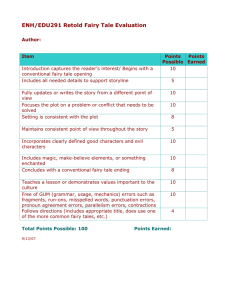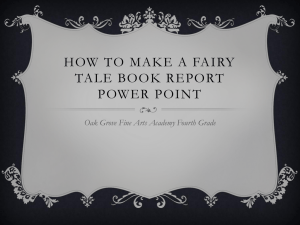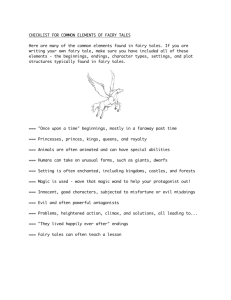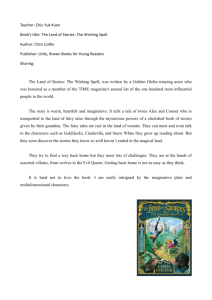Fairy Tales Today An Honors Thesis (HONRS 499) By
advertisement
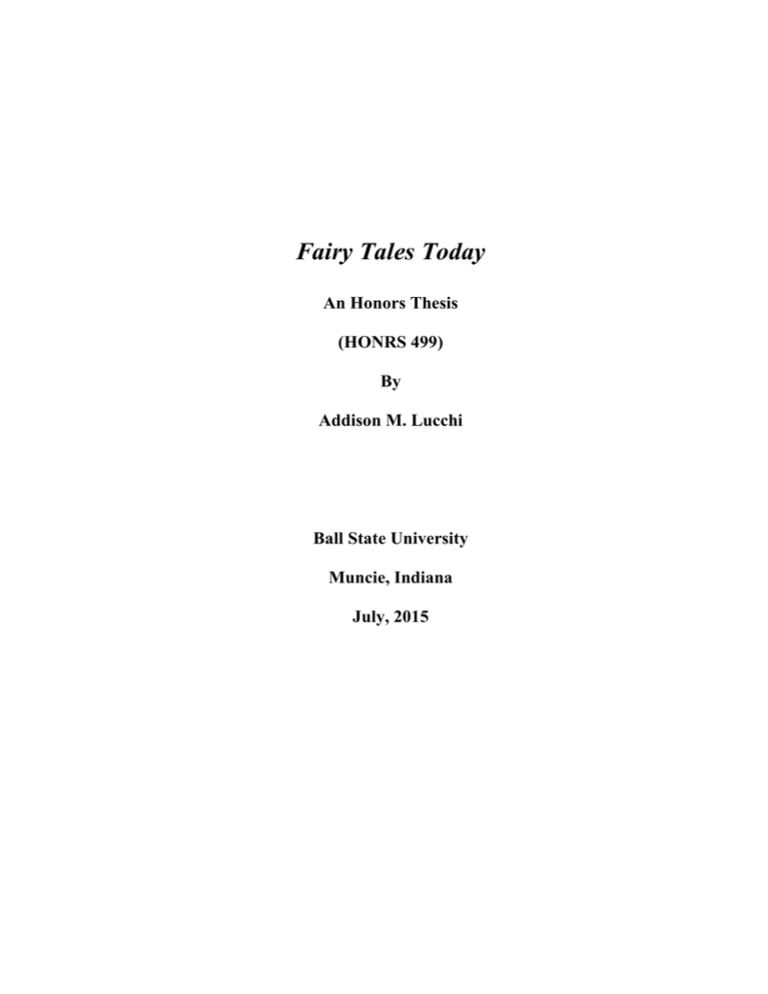
Fairy Tales Today An Honors Thesis (HONRS 499) By Addison M. Lucchi Ball State University Muncie, Indiana July, 2015 Fairy Tales Today: by Addison Lucchi Abstract: What is a modern fairy tale? Who should read these fairy tales? Why are reading fairy tales important? Fairy tales can come in many different forms and many different genres. Some fairy tales are written for children, some are written for adults, and some are written for readers of all ages. Stories like this are a very important part of a child’s development, and they continue to be important throughout our whole lives. While fairy stories can teach us valuable lessons, give us characters to relate to, and inspire us with wonder and joy, there are also certain dangers associated with reading fairy tales. Specifically, this paper will define the modern fairy tale and explain why it is still important today by referencing and expanding on quotes from the essays of C.S. Lewis, J.R.R. Tolkien, G.K. Chesterton and George MacDonald. What is a Modern Fairy Tale? “The definition of a fairy-story—what it is, or what it should be—does not depend on any definition or historical account of elf or fairy, but upon the nature of Faërie: the Perilous Realm itself, and the air that blows in that country,” ~ J.R.R. Tolkien. When I try to answer the “what is a fairy tale” question in conversation, I usually answer the same way George MacDonald did: I recommend my favorite fairy tales… “Read Peter Pan,” I say, “Read Grimm, read Anderson, read Stardust, read the Narnia books… and perhaps by reading all of those, you will then understand what a fairy tale is. And then of course, I also direct them to great essays such as “On Fairy Stories” by Tolkien, “On Three Ways of Writing for Children” by C.S. Lewis, “The Fantastic Imagination” by George MacDonald, and “The Ethics of Elfland” by G.K. Chesterton. In particular, this article is meant to show you what it is that defines a modern fairy tale, as opposed to folk tales or myths. Guided by some of these stories and essays, here are some of the key elements that make a modern fairy tale what it is. 1. Fairy Tales Put the Ordinary Into the Extraordinary “Most good “fairy-stories” are about the adventures of men in the Perilous Realm or upon its shadowy marches,” ~ J.R.R. Tolkien. The protagonist of a fairy tale is never a superhero, never a fairy, and never a magical creature. Fairy stories are about someone ordinary, someone seemingly unimportant, who then travels into an extraordinary realm full of wonder, and magic, and fantastical beings. Often, this is a normal, somewhat discontent human child who leaves behind the monotony and difficulties of real life to travel into the Perilous Realm of Fairyland – The Chronicles of Narnia, Alice in Wonderland, Peter Pan, and The Wizard of Oz all come to mind. Another wonderful modern fairytale that does this beautifully is Cathrynne Valente’s “The Girl Who Circumnavigated Fairyland in a Ship of Her Own Making”. When an ordinary protagonist enters an extraordinary world, it is almost as if we ourselves are entering Fairyland. 2. Fairy Tales Evoke Wonder “This elementary wonder, however, is not a mere fancy derived from fairy tales; on the contrary, all the fire of the fairy tales is derived from this,” ~ G.K. Chesterton. True fairy tales have a certain mood to them, a certain power that I cannot describe as anything else but wonder. It is not essential that fairy stories contain adventure, it’s not essential that they contain allegory, it’s not even essential that they are fantasy in genre. But I do believe that this “elementary wonder” is a vital part of a true fairy tale. It’s what Tolkien referred to as the “nature of Faërie”. The magical air that blows in the country of the Perilous Realm. It’s something that cannot be described by a single word, but wonder comes the closest – though perhaps joy is another way to describe it. Wonder and joy are the true source of the magic of Fairyland. 3. Fairy Tales Are Reasonable “There are certain sequences or developments which are, in the true sense of the word, reasonable. They are, in the true sense of the word, necessary… We in fairyland (who are the most reasonable of all creatures) admit that reason and that necessity,” ~ G.K. Chesterton. An important fact about Fairyland is that it has rules. In Fairyland, anything can happen – magical, whimsical, fantastical things – but they all happen very reasonably and according to the rules of the place. This doesn’t mean that these laws can’t be broken – the very definition of a law is that it CAN be broken – but only according to reason. Fairyland must have laws, and rules, and reason – just as the real world has magic, and adventure, and miracles. 4. Fairy Tales Are Meant To Be Retold “It is possible that God says every morning, “Do it again” to the sun; and every evening, “Do it again” to the moon. It may not be automatic necessity that makes all daisies alike; it may be that God makes every daisy separately, but has never got tired of making them,” ~ G.K. Chesterton. Fairy tales are meant to be retold. Isn’t it incredible that stories as old as Cinderella and Sleeping Beauty (first published by Basile in 1634) are still being told today? And who knows when the oral tradition (when a story is told by word of mouth as opposed to being written down) of these stories began. Versions of each of these stories exist over numerous cultures, and they’ve also been adapted and retold in operas, plays, ballets, films, and novels. Clearly, these stories are worth retelling. Fairy tales are, however, different from these oral folk tales. While folk tales typically come from oral stories that are important to a particular culture, fairy tales do not have to be linked to culture, history, or oral tradition. One of the main differences between the modern fairy tale and the folk tale is that while the modern fairy tale is written by a particular author, the folk tale is simply written down based on an oral story that was passed down through generations. Cinderella and Sleeping Beauty are excellent examples of oral tradition fairy tales, and the Grimm brothers and Charles Perrault are both examples of folk tale compilers who are not actually authors of their work. While fairy tales and folk tales are not entirely the same, fairy tales do borrow many ideas, themes, and stories from oral folk tales. However, this is not to say that fairy tales can not or should not be original. In Fairyland, there are infinite ideas, and an unending number of new stories to tell. But even the new stories will carry some element or some inspiration from a story that has already been told… and that’s okay. There is beauty in repetition. 5. Fairy Tales Mean Something “A fairytale is not an allegory. There may be allegory in it, but it is not an allegory. He must be an artist indeed who can in any mode, produce a strict allegory that is not a weariness to the spirit,” ~ George MacDonald. A true fairy tale has meaning – a reason for reading beyond entertainment or escapism. This isn’t to say that a fairy tale should be an allegory, or that it even needs to have a particular lesson or moral associated with it. But a fairy tale that contains true wonder and beauty cannot help but have some sort of meaning. It is true that some fairy tales do have intentional, easy-to-spot themes or morals. The tales collected by Charles Perrault were even written with a moral stated at the end. For instance, Perrault’s version of Cinderella (or The Little Glass Slipper) ends with the stated moral that grace is more important than beauty. This is a moral that appears in nearly every version of Cinderella, including the modern day film adaptation from 2015. In this version, the courage and kindness of Cinderella versus the outward beauty and charm of her stepmother represents this theme. There are many different ways to present the same moral. Hans Christian Andersen is also very well known for intentionally writing themes and lessons for children into his stories - most of the stories he wrote were reflections on his own life, people he met, and things he experienced. Love, religion, memories, and life after death are some of the most common themes that are present in a number of his stories. However, while a fairy tale should mean something, it is not necessary that a fairy tale have an intended theme or moral. If it simply contains wonder, beauty, and truth, it will have meaning, and it will at the very least wake things up in the reader and inspire him to think. Merits of Fairyland 1. Intelligence & Morality “If you want your children to be intelligent, read them fairy tales. If you want them to be more intelligent, read them more fairy tales,” ~ Albert Einstein Fairy tales are also impactful on intelligence, especially for children. Intelligence doesn’t just mean reason and logic – intelligence is the ability to acquire and apply knowledge. Reading fairy tales teaches you how to apply the lessons, experiences, and feelings you gather in the stories to real life, while also waking up your ability to wonder and imagine. Many fairy tales – like those of Perrault and Anderson – are written with a specific moral or lesson in mind to teach children. Some are written with a looser theme, but the essential fairy tale morality is still there. The morals of fairy tales are absolute – there is no relativism here. There is right, and there is wrong; there is good, and there is evil. 2. Escape & Recovery “It is the mark of a good fairy-story, of the higher or more complete kind, that however wild its events, however fantastic or terrible the adventures, it can give to child or man that hears it, when the “turn” comes, a catch of the breath, a beat and lifting of the heart.” ~ J.R.R. Tolkien. Tolkien said that escape is one of the main functions of fairy tales – and not at all in a bad way. Fairy tales do offer an escape from the real world, but that is one of the functions of stories in general– to offer a temporary rest from the trials of life, while also equipping the reader for his re-entry. In this way, stories are like a Rivendell. Reading fairy tales in particular offers a special recovery of the soul – a certain revival and a reawakening. Fairy stories are extraordinary in their ability to restore joy while also making trials and dilemmas of the real world seem so much clearer and somehow easier to face. They show us that happy endings might be true. The consolation of the happy ending is an important part of fairy tales – what Tolkien calls the opposite of Tragedy – Eucatastrophe. When reading fairy stories, we expect this joyous turn, this miraculous grace that dispels darkness and denies defeat. 3. Joy & Sincerity “This ”joy” which I have selected as the mark of the true fairy-story, or as the seal upon it, merits more consideration,” ~ J.R.R Tolkien. Sincere joy is the primary reason why reading fairy tales is important. Sincerity is especially valuable in the midst of cynicism and arguably, postmodern thought. It is popular to believe that the happy ending is “contrived” and pure good is “naïve”… that simplicity is “boring” and that hope is “unrealistic”. But the joy of fairy tales is stronger than the despair of cynicism. Fairy tales are important because they bring light and truth into a culture that loves darkness and relativism. We need the simple, pure morals and happy endings of fairy stories. We need their recovery and their wonder. We need the sincere joy of fairy tales. Fairy tales are important because they prove that happy endings are more than true, and that goodness and truth will always prevail in the end. Dangers of Fairyland “A safe fairyland is untrue to all worlds,” ~ J.R.R. Tolkien. I also think it is important to understand the dangers of Fairyland. Whether you consider these dangers to be good or bad, you should at least know them in advance – both how they might affect you as a reader, and if you write a fairytale, how they might affect those you are writing for. In “On Three Ways of Writing for Children”, C.S. Lewis defended the fairy tale against the common arguments for why children should not read fairy stories. By looking at these defenses, we can see some of the likely dangers of Fairyland – and also understand why these may not really be dangers at all. 1. False Impressions of Reality “The fairy tale is accused of giving children a false impression of the world they live in. But I think no literature that children could read gives them less of a false impression. I think what profess to be realistic stories for children are far more likely to deceive them,” ~ C.S. Lewis The fairy tale is often accused of giving people – adults and children alike – false impressions of reality. The idea is that children will read a fairy tale and expect real life to be just like it, or that an adult will read a fairy tale and grow discontent with his own life in comparison. However, Lewis refutes this idea by stating that he never expected the real world to be like the fairy tales – but he did expect the real world to be like the school stories, the kinds of stories that contain entirely possible adventures that are in reality almost entirely improbable. Most readers are smart enough to not confuse real life and fairy tales. In fact, fairy tales can actually help give readers a truer glimpse of reality. While it’s true that pain and evil exist, it’s also true that love and goodness will always prove stronger. Fairy tales help us to see that even though life isn’t easy or painless, good will win in the end, and all of our trials here will be worth it. 2. Unfulfilled Longings “It would be much truer to say that fairy land arouses a longing for he knows not what. It stirs and troubles him (to his life-long enrichment) with the dim sense of something beyond his reach and, far from dulling or emptying the actual world, gives it a new ‘dimension of depth. He does not despise real woods because he has read of enchanted woods: the reading makes all real woods a little enchanted. This is a special kind of longing,” ~ C.S. Lewis This danger is related to the previous, but it is also different. This is distinct from thinking reality is going to be like Fairyland – it is knowing that it isn’t, but wishing it was. It’s the longing to live in a land of magic, full of fantastic creatures and enchanted forests, and adventures. A land much more wonderful and exciting than our world. But is this longing really such a bad thing? And is it really even unfulfilled? I think it is not only natural to have longings such as these, but also important. We should have longings for a land that is better, and more magical than our own – the land that is our true home, which we will someday return to. 3. Fear “If I could have escaped all my own night-fears at the price of never having known ‘faerie’, would I now be the gainer by that bargain? I am not speaking carelessly. The fears were very bad. But I think the price would have been too high,” ~ C. S. Lewis. Children and adults alike understand that in fairy tales, there are going to be forces of evil as well as of good. There are going to be dragons in addition to fairies and princesses. But those of us who read fairy tales still choose to do so in spite of, or maybe even partly because of the dragons. Even if we know the dragon is going to be defeated, we want to know how. We want to know what obstacles the hero is going to overcome, and in what ways the hero will change as a result of her adventures. By seeing the dragons beaten and the witches vanquished, we realize that our own fears can also be overcome. There is plenty to fear in Fairyland but even after knowing the dangers of Fairyland, we still choose to go into the wardrobe, or down the rabbit hole, or second star to the right and straight on till morning. Reading and Writing Fairy Tales Now that we have discussed both the importance of modern fairy tales, including their merits and their dangers, we must briefly look at what this means for both readers and writers of fairy tales. Looking at the dangers of Fairyland, it is easy to see how each of these dangers is not really a danger at all. Every danger has a plus, and every fear can be overcome. As shown by the previous section, children and adults alike will get so much more good out of reading fairy tales than bad. However, what do all of the perceived dangers mean for writers of fairy tales? Whether or not the dangers of fairyland are valid, it is still true that many readers are worried about them. Should writers avoid stories about other worlds, magical places, and evil beings in order to not subject their readers to the possibility of false impressions, unfulfilled longings, and fear? Certainly not. Instead, writers of fairy tales should prove the naysayers wrong by turning each of these dangers on its head. Writers should show that though there is evil, good will always defeat it. This is, after all, one of the central premises of the fairy tale. Author’s Statement for “About Tyme”: a Modern Fairy Tale for Adults “About Tyme” is quite simply, a modern fairy tale for adults. As it is not the genre that makes a fairy tale a fairy tale, I decided to endeavor to write a fairy story that is not what one may think of when they think “fairy tale”. In may ways, “About Tyme” is a genre mixing novel – it contains time travel, fantastical worlds, and a mystery that is central to the plot. However, all in all, “fairy tale” is the term I’d use to best describe it. I decided to write “About Tyme” as a modern fairy tale instead of a traditional fairy tale for a number of reasons. One of the purposes of me writing this story is to show how it is not the traditional form or a certain style of writing that make a fairy tale what it is. Thus, by writing this story in a more modern way, it is easier to show how fairy tale ideas and themes can transcend form. By “modern” I do not mean present day - I would consider “The Hobbit” and “Peter Pan” to also be a modern fairy tale for the same reasons. In the novel, the protagonist - Fredrick Tyme – is an ordinary man who is thrown into a series of extraordinary events. He is the hero of the story in the sense that he is the protagonist, and he does became a sort of actual “hero” by the end. But throughout the story, Tyme begins a very ordinary person. It is only Fairyland itself and the events he is thrust into that change him. The story begins with the scene below, there are so many more surprises and new worlds for the hero to experience. From traveling through time to traveling to Fairyland, Fredrick Tyme lives a story that truly embodies the fairy tale theme of putting the ordinary into the extraordinary. “About Tyme” is also a fairy tale in other ways – by inspiring wonder, following rules, and incorporating ideas and references from other stories. While only a few fairy tales are directly referenced in the story, many ideas are present that are directly inspired by stories such as Alice in Wonderland, Harry Potter, The Hobbit, and The Chronicles of Narnia. Before I began writing this chapter, I took a few months to plan and develop my story. I knew that I wanted to write something that could fit the genre of “fairy tale”, while also being modern and not conventional fantasy. The character of Frederick Tyme is very much inspired by Bilbo Baggins from The Hobbit. He is a reluctant character who loves home and comfort – and yet deep within him is a longing for adventure and a love of excitement. Over the course of this novel, the adventurous side of Mr. Tyme will begin to come out more and more. After much thought and development, I realized that my story would work best with a mystery element to it. The sense of mystery and discovering clues is essential to the plot, and so by the end of my development I realized that this was really a fairy tale mystery, with elements of both science fiction (time-travel) and fantasy (other worlds). I decided that this fit perfectly with my goal for the project – to write a story that demonstrates that genre is not what determines a fairy tale. For the purpose of this project, I have only written the first chapter – though I do plan on finishing the novel and eventually submitting to publishers. I am a part of a community of fiction writers, and they are all excited to edit and critique my work further as I write more. In further chapters, Tyme will learn more about the Tyme Agency and its true purpose, as while as realizing there is much more to it than even Valucia and Sparrow know. Through time travel, magical books, and actually entering Fairyland, Tyme is thrust into a world of wonder and whimsy. But all of that comes later. For now, I hope you enjoy the first chapter of my story: “About Tyme”, a Modern Fairy Tale for Adults.”. Original Chapter: “About Tyme”, a Modern Fairy Tale for Adults Chapter One: Foregate Street There's something mysterious about Tyme. Tyme seems to run in order, and yet in actuality, Tyme's all jumbled up. Tyme is disorderly. Tyme is confusing. Really, Tyme is just downright weird. Now, “time” is all of those things too, but not quite to the same extent as the unlikely hero of our story: Fredrick N. Tyme. Fredrick’s childhood was as jumbled up as his personality. He was born in the year 2229 to a Richard and Winnifred Tyme. As the youngest of the Tyme family’s three children, Fredrick was very much the baby of the family. However, being the family baby didn’t just entail extra attention, special perks, and qualifying for children’s pricing at restaurants. No, being the youngest had its disadvantages too, and (at least in Fredrick’s opinion) these far outweighed any plusses. You see, since Fredrick was the third and last child, his parents didn’t put the same pressure upon him to succeed in the great game of life - real life, not the board gaming involving little cars and a colorful spinning wheel. Though I suppose this sentiment does go for the board game too, as poor little Fredrick never won a single game against his competitive (and apparently very lucky) siblings. Now, you may see this lack of pressure as a good thing – after all, without pressure from his parents, Fredrick had the opportunity to pursue whatever he enjoyed doing and was passionate about. He didn’t need to worry about making his parents proud, because they were already plenty proud of their first two siblings. When I say plenty proud, I don’t mean as in: “Oh good job son, you got a 4.0 in college and won your violin concerto competition. Good on you, son”. No, I mean like the proudest parents in the history of Tyme. Probably in the history of time, too. You see, Fortinbras Tyme, the eldest (His parents decided to set the bar high from a young age by naming him after a certain Norwegian crown prince), was accepted into the mysterious and highly selective group known as “The Time Agency”. Many of Fortinbras’s friends believe that his acceptance into this prestigious organization resulted mostly from the puns that could be contrived from a name like “Tyme”. However, according to Fortinbras and his family, he was accepted because of his off-thecharts IQ, incredible athleticism, and the fact that he’d memorized the first three of Sir Arthur Conan Doyle’s Sherlock Holmes novels and was half way through memorizing the fourth. Now, what exactly “The Time Agency” (New Congress passed a motion last fall indicating that the organization must always be written AND spoken in quotations) did is as much a mystery as A Study in Scarlet. But whatever it is, it’s SOMETHING involving time, and a very difficult place to land a job. And I mean VERY difficult. Every year, approximately 100,000 application - or 110,000 on a leap year (It’s amazing how many people apply on February the 29th!)- go through the system, and no more than 9 individuals are EVER a part of the Agency at one time. So when Fortinbras landed a job with them, it wasn’t just impressive. It was this-guy-could-be-put-into-the-next-history-book worthy. And he was. Tyme’s sister didn’t quite live up to her older brother’s success, but she got pretty darn close. After graduating university with a triple major (Quantum physics, cooking, and melodramatic theatre... odd mix, right?), Bernice Tyme became the first female president of the StillMostly-United States of America in the year 2233 (Yup… it took them THAT long to elect a female president). So yeah. ALMOST as cool of a gig as big brother. After Fortibras the Agent and Bernice the President… came Fredrick. The letdown. The nobody. The unsuccessful. While his older siblings went off to their new spiffy jobs, Tyme stayed home and did nothing but read mostly fiction - all day, every day. Until one lazy summer afternoon, just a week after his mother’s tragic death and his father’s mysterious disappearance, Fredrick N. Tyme finally got his opportunity to shine. The story of that success and how Fredrick came to be the most successful member in the history of the Tyme family is a mystery. Literally. The first adventure of Fredrick Tyme begins in his home - a converted office building in Worcester, England on the corner of Foregate and Castle Street, just a block down from the old train station. Foregate Street station… the place where this mystery begins, and the place where all the fun starts – though in the end, it will be up to you to decide whether or not “fun” is the right word for this tale of death, plotting, and intrigue. Perhaps “exciting” is a more accurate word to describe our tale. Excitement. After Tyme’s 23 years of living, he still hardly knew the meaning of the word. He knew what it technically meant, and he understood the sort of things that could cause it - Tyme shared the excitement of the fictional characters in his favorite stories, and he saw excitement in the faces of his siblings all the time. But in all 23 years of his life, Tyme had never had the opportunity or reason to really feel excited for himself. So it was on this day, November 23, 2251, that Fredrick felt real excitement for the very first time in his life. And here’s how it happened: It all began with a series of raps from outside Tyme’s office door, interrupting a climactic moment of Berlioz’s Symphonie Fantastique that he had been blaring from the antique 2010 CD player that sat on the corner of his desk. Tyme turned off the player and reluctantly set down his Agatha Christie novel, making sure to bookmark the page number for when he returned to the story in a few minutes. Another round of knocking sounded as Tyme stood up quickly. Tyme stood still for a moment. When was the last time someone had knocked on his office door? Not since... a week ago, when he ordered Murder on the Orient Express. But Tyme didn’t remember ordering any other books, and Tyme had a perfect memory. His mother was dead, his father was gone, his sister lived across the ocean, and his brother only got time off on Christmas Day and Pi Day. So WHO was knocking on the door to his office? That was the question still running through Tyme’s head as he walked to the door and opened it. On the other side of the doorway stood two eccentrically dressed individuals. The first wore a full black suit, complete with coat tails, top hat, and cane. The second wore what appeared to be an ancient World War II Russian military uniform, and the woman’s fingers were wrapped tightly around the handle of a long Russian sword. The amount of time Fredrick stared at the odd pair in front of him without speaking was enough to elicit an awkward clearing of the first individual’s throat. “Salutations, dear sir,” the man said, tipping his hat confidently, “Allow us to introduce ourselves. I am Mr. Sparrow, and my friend here is Miss Valucia.” Miss Valucia narrowed her eyes and nodded solemnly. “Please don’t be scared by my comrade… she can sometimes come across as a bit intimidating…” Miss Valucia whirled to face Mr. Sparrow, “Ees dat anyother Russian zjoke? Ve’re peeple too, ya know!” “Hehe, yes, of course, I know that, Diana. Russians are awesome. I love Russians. Like Chekov… from that old show. He rocks!” Miss Diana Valucia still appeared unsatisfied, but she rolled her eyes and backed off. “Anyways…” Mr. Sparrow continued, “We are here about a murder investigation. And we believe you, sir, to be the person responsible.” If any form of liquid had been in Fredrick’s mouth, this would have been the perfect opportunity for him to spew it all over Sparrow and Valucia. But since his mouth was currently as dry as Tatooine, all that escaped was a pitiful puff of CO2. Fredrick quickly recovered, “You think I’m a MURDERER?” “Ha! HA. Bahahaha! No, my dear lad. We’re not under any allusions that you are capable of anything so… successful. No, we’re here because the victim was murdered on your property, and thus all investigations in this case are your responsibility.” “My responsibility? Just because he-?” “She,” Sparrow corrected. “-SHE was killed on my property?” Miss Valucia gave another solemn nod. Fredrick’s head was buzzing, and it wasn’t just from the wine he’d been drinking, “You can’t be serious. I’ve been home all day. Nobody could have been murdered here… I would have heard something!” “Yes, well… she wasn’t murdered today.” “I was here yesterday too. And all the rest of the week.” Sparrow shook his head, “She wasn’t murdered today, she wasn’t murdered this week, she wasn’t murdered this year. But She WAS murdered, and on your property.” Fredrick felt as if he was having a very annoying dream that he couldn’t get himself to wake up from, “I don’t understand… then when was she murdered?” “December the 24th, 2253,” Sparrow answered matter-of-factly. Now Fredrick knew that one of three things was happening: 1. This WAS a really annoying dream. 2. Mr. Sparrow was mentally insane. Or maybe a serial killer. Either way, not the sort of guy Fredrick really cared to be acquainted to. Or: 3. Fredrick had developed a sudden intolerance to alcohol, and the small glass of wine he’d drunk during his reading session had caused him to go into a drunken stupor in which he was imagining an odd business man and an ill-tempered Russian from two years in the future. At this point, Fredrick Tyme didn’t know WHICH option had more basis in reality, so for a moment he just stood there, glancing back and forth between the two figures on the other side of the doorway. He thought very briefly about just shutting the door on them, locking it, and forgetting that this whole unsettling affair had happened at all. But the thought quickly passed, and Fredrick asked another question instead: “So why am I responsible for a murder that supposedly happened two years in the future?” Sparrow’s shoulders slumped, “Because, the murder took place on YOUR property. I already explained this! What you SHOULD have asked, is why we had to travel to 2251 to find you.” “Okay… why then?” “Because this very night, about two hours from now, you disappear from the face of the Earth. Tonight, you leave this building and never return. NOBODY returns to this building until December 24th, 2253, when a young lady is murdered in this very room.” If Fredrick had been confused and distraught before, now he was completely bewildered. And also just a little bit scared. “I can’t tell you more than that, because I don’t know. Only the top Agents are allowed access to future information. We only know what they tell us.” “Wait… you two are from ‘The Time Agency’?” Tyme made sure to put air quotes over the name as he said it. “Indeed. Agents 9 and 10, at your service.” Sparrow tipped his hat again, and Valucia bowed her head slightly. Tyme’s mind was now a race of activity, thoughts dashing past each other at such speed that Tyme didn’t have time to fully gather them, “So… my brother, Fortinbras?” “Yup, we know him!” Sparrow nodded, “But I’m sorry Fred, I can’t tell you anything about your brother… not where he is, not when he is, not what he does, not even his Agent number. But there is a chance you could learn more about him later on… IF you take the case.” “Oor, Rick, you can styay here and nyever lern anythink about yer bruder,” Miss Valucia finished, smiling in obvious satisfaction at her English speaking skills. Fredrick glared at her, “Okay, first of all, it's not Fred and it's certainly not Rick - it's Fredrick.” The two muttered their quick apologies and proceeded to write that down on their personal notepads. “And second and finally… I can’t take this case because I don’t know HOW. I’m not a detective. I’m not a success. And I for one still don’t believe that time travel is even POSSIBLE. How am I going to solve a murder investigation that takes place… in the future?” “Everything you need to know will be explained in your detailed crime packet.” “Crime packet?” “Yes, that’s this here!” Sparrow held out the manila folder he’d been holding, and Fredrick took it, “That packet will give you any information we have related to the crime. Read through it, and then meet us at Foregate Street Station in exactly one hour. We’ve got to get all of the travel negotiations set up. “Travel negotiations…?” “Explained in the Crime Packet,” Sparrow answered. Fredrick started to open the folder, but he stopped when he noticed the bold words on the front, written in what appeared to be pink crayon: “THE FOREGATE MURDER MYSTERY. THREAT LEVEL: HIGHLY DANGEROUS FOR ALL PARTIES INVOLVED.” Murder? Danger? Mystery? Suddenly all of Fredrick’s apprehension came back, “Okay, I’ve changed my mind, NO WAY am I doing this...” He stopped midsentence. He was once again standing in an empty office, staring at an empty open doorway. Fredrick Tyme didn’t know what had just happened, but he assumed it had something to do with the travel accommodations the pair had spoken of. And so instead of knocking his head against to wall in an attempt to wake himself up from what was probably a horrible and fantastical dream (though he did consider it), Fredrick just let out an exasperated groan, sat back down in his office chair, and opened the folder to reveal its contents. The first thing he noticed was a round pin, displaying what he knew to be the official “Time Agency” emblem (a skull and crossbones, only with the crossbones replaced with a magnifying glass and flashlight, and the skull replaced with a clock). On the pin were etched the words: “DETECTIVE TYME”. Fredrick rolled his eyes, but he decided to put the pin on anyway. Something about wearing the title “Detective” made him feel much more professional. Who knew… perhaps as a detective, he COULD be capable of success. Fredrick was a nobody, but perhaps this new detective was something better. In that moment, he decided: Fredrick Tyme was no more. This was the hour of Detective Tyme. Detective Tyme grabbed the file from his desk and flipped off his lamp. For a moment his fingers lingered over the spine of the Agatha Christie novel on the desk. It was still bookmarked, as if waiting for him to pick it up and uncover the end of the mystery. But really, Tyme didn’t need to know the end of that mystery anymore… because now he had his own to solve. He turned away from the novel and strode through the still open door. As he shut the door behind him for what - according to Sparrow - would be the last time, the detective began to feel something move within him that had been waiting his entire life to emerge. The feeling started out small, but soon it crept through his entire body, spreading until Tyme’s entire being was comprised of a certain wonder, thrill, and sense of adventure. Tyme was excited. About time! Bibliography: 1. Lewis, C.S. “On Stories: And Other Essays on Literature”. Boston: Houghton Mifflin Harcourt, 2002. Print. 2. Chesterton, G. K. “Orthodoxy”. Whitefish: Kessinger Publishing, 2004. Print. 3. Tolkien, J. R. R. “On Fairy-Stories”. Oxford: Oxford University Press, 1947. Web. 4. MacDonald, George, “The Light Princess and Other Stories”. Grand Rapids: Wm. B. Eerdmans Publishing, 1980. Print. 5. Vansina, Jan, “Oral Tradition”. Chicago: Aldine Publishing Company, 1961. Print.
